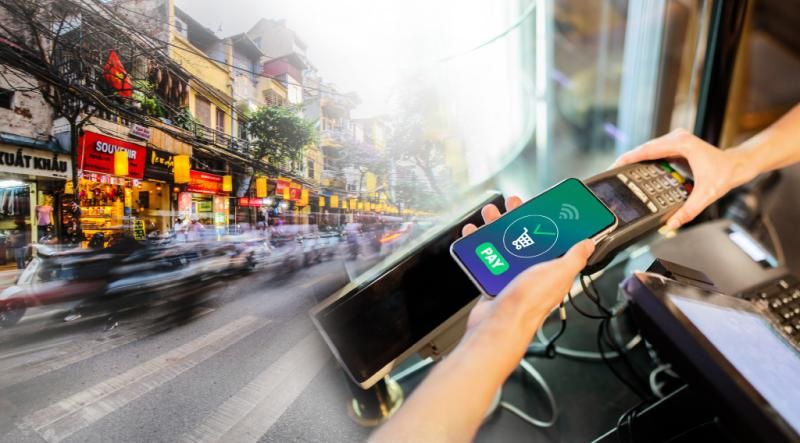The Rise of Cashless Transactions in Hanoi: A Glimpse into the Future of Payment
The digital era has heralded an unprecedented change in how societies transact. In Hanoi, the heart of Vietnam, non-cash transactions are swiftly gaining ground across diverse sectors of society, encapsulating everyone from office workers and small businesses to freelancers. Imagine walking the picturesque streets near Hoan Kiem Lake and witnessing

The digital era has heralded an unprecedented change in how societies transact. In Hanoi, the heart of Vietnam, non-cash transactions are swiftly gaining ground across diverse sectors of society, encapsulating everyone from office workers and small businesses to freelancers.
Imagine walking the picturesque streets near Hoan Kiem Lake and witnessing an everyday scene where a tourist, having selected a Vietnamese figurine, struggles to pay with coins and notes. The ever-adaptive street vendor, Thuy Trang, seamlessly comes to the rescue, providing a QR code for an effortless digital payment. Trang's sentiment, shared by many, is a testament to the convenience this shift brings, “It is convenient for both me and my customers.”
But this isn't an isolated incident. QR code payments have woven themselves into the fabric of the city's daily life. In a robust initiative by local authorities of the Hoan Kiem District, Hanoi’s bustling tourist hub, there's an ambitious plan to introduce cashless payment signages, aiming for a complete switch to cashless transactions by December. The rationale is evident: with 9,000 individual businesses and a footfall of roughly 250,000 visitors daily, the district offers an optimal environment to nurture and showcase the future of digital transactions.
The district isn't merely jumping on the bandwagon without preparation. An impressive 85% of its digital transformation in administrative functions has already been achieved. For consumers like Tran Van Hung and Ngoc Diep, the benefits are palpable, from avoiding the inconvenience of physical cash withdrawals to seamless and swift payments through apps.
The city's visionaries are aligned in this journey. Pham Tuan Long, Chairman of the People's Committee of Hoan Kiem District, sees the district as primed for this shift. In his words, even minuscule amounts can now be transacted digitally, symbolizing the district's preparedness.
The drive to cashless doesn't stop here. Hanoi envisions each district and town boasting a cashless payment street, with numbers swelling each year. Nguyen Viet Hung, of the Hanoi Department of Information and Communications, elucidated on the collaborative efforts between his department and the Hoan Kiem District to expand these initiatives, starting at ward levels and gradually engulfing the entire district.
At the heart of this transformation is the recognition of a rapidly digitizing world. Ha Minh Hai, Vice Chairman of the Hanoi People's Committee, stresses the importance of embracing e-commerce and digital payment systems, especially against the backdrop of the fourth industrial revolution.
However, this initiative isn't solely about payments. It’s an ecosystem where citizens become digitally savvy, exploring innovative payment methods and gaining access to myriad digital utilities and applications. Pham Anh Tuan of the State Bank of Vietnam emphasizes the multifaceted advantages of cashless payments – from transparency and convenience to enhanced cash flow management.
Aligning with the National Digital Transformation Day, the launch in Hoan Kiem District is a pivotal step in Hanoi's roadmap. Beyond facilitating transactions, the city also aims to create a vibrant platform for banks and non-cash payment service providers, advocating for ethical and competitive offerings.
Hanoi's overarching vision is ambitious. As detailed in Plan No. 239, the city is laying down strategies to morph into a smart city by 2025, with an extended vision until 2030. The roadmap involves the digital economy contributing a significant 30% to the City's GRDP, establishment of smart urban zones, and pioneering smart services in select districts, spanning domains like healthcare, education, and clean water provision.
In a nutshell, Hanoi isn't just embracing a digital payment methodology. It's embarking on a holistic journey to become a beacon of digital transformation, setting a benchmark for cities worldwide.




